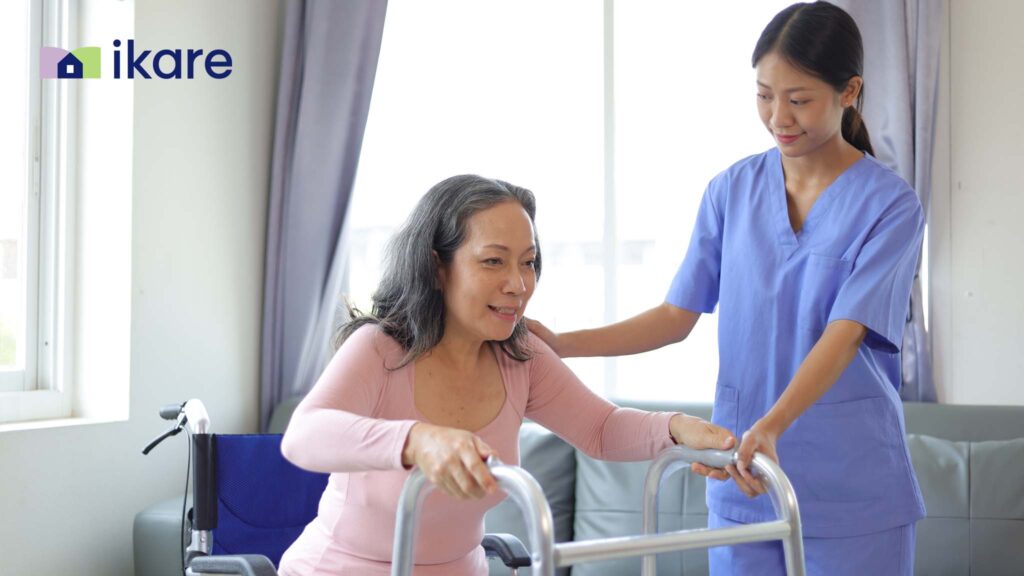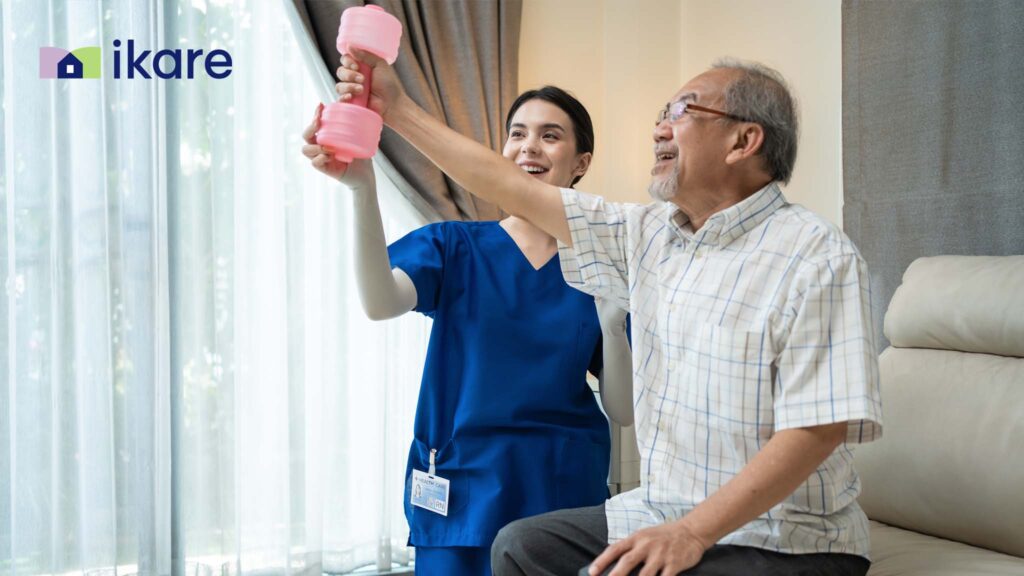
Dementia
It is overwhelming to care for your loved ones with dementia, especially in Singapore where families struggle with busy careers and responsibilities. Hence engaging in a home-based dementia therapy solution will help offer significant advantages. Home-based dementia therapy comes along with one-on-one personalised care from well-trained nurses, while providing a sense of relief to inexperienced families.
Furthermore, having them surrounded by their favourite belongings and loved ones, dementia therapy can help patients receive care in a familiar and comfortable environment. Dementia therapy will help provide them with a sense of involvement and help keep patients active, In this article we will explore the different aspects of dementia therapy to help you better understand this debilitating condition and its care requirement. Our experienced nurses here at iKare will also be sharing practical tips on how you can better manage your daily challenges as well as measures you can take to keep your loved ones safe.
Dementia Care Singapore
Benefits of dementia care Singapore, dementia is a progressive condition that can be led to rapid decline in cognitive function, physical health as well as emotional well-being. Working together with iKare will help slow this decline as well as enhance their quality of life and help patients remain independent as much as possible.
Dementia care Singapore priorities the patient’s physical health by incorporating activities that promotes blood circulation and overall health. Starting with small and easy movements to gradually increasing in intensity over time. The caregiver may also attempt to exercise alongside the patient to promote confidence.
Recommendation: Remember to maintain an agreeable atmosphere during the workout! The patient can enjoy his/her favourite music during the exercise, or converse on attractive topics. Keep a positive outlook and give praises to strengthen the patient’s motivation. This aids patients in preserving their independence, enabling them to perform typical actions such as walking and dressing. Consistent exercise fortifies the muscle. Such physical exercises will helps strengthen the muscles, improve blood circulation and also enhances balance and coordination (crucial factor in preventing falls).
Physical activity is frequently linked to an improvement in a person’s emotional state. This is due to the discharge of endorphins. These biochemicals within the body are natural “feel-good” hormones of it. Regular physical activities can considerably contribute to the improvement of the patient’s memory. Furthermore, it also notably elevates the quantity of blood that flows to the brain, such activities can greatly assist in strengthening the development of new brain cells and decelerating the decline of the patient’s cognitive wellness. This will help to reduce multiple indications of depression.
Having dementia therapy at home allows for highly personalised strategies that would be difficult to replicate in a traditional nursing home. There is no one-size-fits-all approach with us at iKare!

iKare Real Nursing Stories
iKare Real Nursing Stories: My patient, male 76, suffers from severe dementia. He does not respond to any family members or talking. My solution is to play oldies songs for him. His favourites are Elvis Presley and Teresa Teng. He always responds when I play music from the curated playlist and moves his head and hands to the music. I would not consider this music therapy, but it is helping my patient. Music brings a smile to his face so it’s now a daily activity for us.- Mr. Pang, iKare Dementia Therapy Nurse
Dementia Therapy in Singapore
The main purpose of dementia therapy is to help slow the decline. Hence, we allow our patients to interact with the same care giver every day to enable them with a safe and familiar environment.
Cognitive decline is an affliction facing dementia patients, coupled with their families; even so, with the right pursuits, it can help patients maintain their cognitive abilities for a prolonged period. Gaming activities can include a selection of puzzles, alongside with memory exercises.
These will substantially help with stimulating the brain, furthermore, supporting the retention of memories. Our caregivers are also able to include photograph collections or mementoes to genuinely encourage conversations concerning the patient’s background. Looking at pictures and using especially supportive questions, such as, “Do you recall when you went on this cruise? Is this your favourite dress?” to encourage cognitive stimulation.
Improved Focus as well as Concentration: Structured activities furnished in a calm and familiar environment can help patients focus in a better way, which is somewhat important for maintaining independence in addition to carrying out daily tasks. Tip: It is usually best to personalise simple puzzles or activities that align with the patient’s past interests and current cognitive abilities. It can somewhat encourage the individual undergoing treatment and generally improve the circumstances.
Engaging in physical activities during the day helps in fully controlling the body’s sleep-wake rhythms, as well as encouraging sounder, more peaceful sleep in the evening in addition to decreasing sleeplessness. This, as a consequence, can absolutely bring about additional positive feelings. These particular feelings can occur specifically during the mornings. It might also increase energy while you do physical activities. Light physical activity, such as with walking or stretching, definitively helps in stimulating the digestive system, additionally promoting with bowel movements as well as reducing the chances of constipation (an issue for the huge majority of people with dementia).

Why Choose Us for Dementia Care Singapore?
Choose iKare for your home-based dementia therapy services. Here at iKare, we do the planning for you, patients can expect a structured and individualised care routine tailored to the dementia type, living habits, as well as the patient’s daily lifestyle.
1. Familiarity and Comfort: Patients are more likely to thrive in a space they know well, reducing disorientation and anxiety often triggered by unfamiliar environment. Being surrounded by familiar items can help patients feel safe and secure, hence, helping to reduce anxiety and confusion. For example, someone with dementia who experiences sundowning—when symptoms increase later in the day—may feel calm while resting in a bright room containing items that are familiar to them. Comprehending the area provides them a feeling of safety along with security there, which considerably reduces the anxiety. In addition to confusion; “patients recovering at home also reported sleeping and eating better, walking around more”.- Clara, C. (2022, Oct 3). Now, a few patients are able to receive hospital treatment within the comfort of their homes. Also, telehealth appointments in conjunction with several home visits are outstanding ways of giving care to these people. The Straits Times.
2. Individualised Care Plan: Every dementia patient is unique, with their own set of needs, preferences and challenges. Dementia therapy at home will allow us to help create highly personalized strategies that will be best suited for the patient.
3. Reduced Risk of Sickness: Remaining at home minimises exposure to viral infections, contagious diseases and other health risks commonly found in communal environments like nursing homes. This can be particularly concerning for dementia patients, whose immune systems are compromised.
Dementia Care Singapore Plans
By incorporating a patient’s passions directly into their individualised treatment strategy may greatly strengthen the individual’s emotional wellness. Considering the patient is in a rather recognisable setting, it will be much easier for nurses to incorporate more activities and objects into their regular tasks. This adjustment is likely to streamline patient care.
Common Challenges You Can Expect with Home-Based Dementia Therapy Services
While dementia therapy within a residence has many advantages, it also has difficulties that family and caregivers need to work through. A more complete comprehension of these challenges can assist families in preparing as well as working even more effectively with professional caregivers. Additionally, families can collaborate with professional caregivers in a more efficient manner. These are the most typical issues you might face, however, iKare offers solutions to all the issues mentioned above. Though these solutions may not work for everyone, since every patient reacts differently to different situations.
Dementia patients may occasionally turn physical, furthermore, they may push back against caregivers when attempting to execute practical tasks, such as putting on socks; do not turn physical with dementia patients, nor try to forcibly restrain them. Dementia is a crippling disease that gravely diminishes a patient’s natural skill to communicate verbally. Consequent to this, they might resort to large explosions of anger.
Solution 1: Allow them to hold onto something for them to interact with, like a genuinely fluffy towel, effectively distracting them, so the caregiver can get the task done.
Solution 2: Offer them increased independence and a stronger sense of control by carefully providing them with choices to choose from.
Solution 3: guide them thoroughly throughout the whole process. Like, “Put your foot right here,” or “Could you assist me in pulling the sock up?”.
In some instances, they will refuse to shower. Do not humiliate them by asserting that they smell bad and require a shower. Perhaps, they do not see enough value in the task. Instead, say something like, “I would like to shower too, but I am concerned that the temperature is too cold. “Could you please try showering first?” Do make sure that the water is comfortably warm, try using comfortable clothes and particularly good-smelling soaps, play music’s that they enjoy, and reward them with their favourite treats after they complete showering.
Try to stay optimistic and say some nice things like, “Wow your shampoo smells so good!”, “Your hair will look so shiny after this.”, “Your daughter will love how fresh you look after bathing.”
Make them look forward to their next favourite activity after emphasising how easy and quick it is going to be, afterwards the patient will get to enjoy their favourite activity.

Dementia Care Singapore
If comes a situation where the patient refuses to put on adult diapers. Do not embarrass the patient by truthfully pointing out that they do not have the ability to control their bowels. Be gentle with the phrasing as well. Do not insist that there is no other solution for them, and they ‘must’ wear it. Try referring to adult diapers as “disposable underwear” or “briefs” that everyone wears on occasion. Mention the rather good and somewhat comfortable diapers for adults to give them a bit of encouragement. You can emphasise that diapers are not only for dementia patients, but diapers can also be used for several reasons (for example, you have recently had a baby as well and found it particularly difficult to hold in your urine, you can consider utilising disposable wear to assist with chore times).
If dementia patient do not recgonise their home and wants to leave, do not be too quick to turn down their request. This is because the patient will end up feeling trapped and mistake you for the “enemy” not allowing him to go home. Instead, first, clarify with them what do they need to go home for. Listen to them as they explain what they are looking for and see if it is something that you can provide them with.
Alternatively, you can also delay their thought by telling them you can bring them back, but your car will need some time to get fixed. Here’s another solution for you, you can pretend to call for a taxi for them and tell them that the taxi has been booked and will need some time before it arrives. While waiting, you can offer the patient some snacks and drinks, this will distract the patient and ultimately forget about the taxi.
You can also ask them where they wish to go. What is the address, as well as guidance on how to get there? Pose open-ended queries, for example, how the house looked like, the exact length of their stay, and the existence of plant or animal life, subsequently steering the conversation toward dialogues concerning their individual lives and career roles.
Pretend to carry out their plan to leave. Allow them to pack their clothes into bags while you are unpacking them at the same time so they get tired. Reassure them that its late and that we can continue packing tomorrow. Dementia patients sees danger everywhere like a stranger in the room, snakes and rats. This may be a case of psychosis, so, remember to never completely dismiss their apprehensions or hallucinations and assert that none of it exists, and the surrounding setting is secure. To dementia patients, the delusion they are facing can seem authentic, and the distress they are suffering can result in unintentional self-injury.
It is best to reassure them “physically” sometimes they may mistake a tall coat hanger as a scary-looking shadow, you can rearrange the environment to make them feel safer. Change their setting to promote improved of safety. Subsequently, provide them with tools to feel safe like an empty bottle spray so they can use it to spray on the snakes and kill them. Or an odd blanket that is saturated with a perfume that will remove threats.
Relocate them to a different, safe environment free from the threats. Pretend that you will contact either the exterminator or another expert for support, so this never repeats itself. After it is done, assure them about the subsiding of the situation and allow them to look around and check.
“Where is my deceased husband? Where did he disappear to? Can you escort me to him?” This is a challenging question; it is obligatory for the caregiver to determine if they either try to relate the truth or redirect it. Distraction will help the dementia patient relief from the distress of recalling the passing of their loved ones;
Ask clarifying questions like, “When did you recently see your husband?” and “Do you know what happened to him to him?”. If the patient is calm, and displays no signs of distress and seems to acknowledge the tragic event regarding their kin, and simply seeks understanding, you can attempt to explain to the patient the passing of their family member.
Should they be agitated, insisting that their family member is still alive, you can give an excuse for where the person went and will be away for a long time. In the meantime, you can distract them with routine activities while “waiting” for their loved ones.
Dementia Patient Accuses Caregiver of Stealing Money
If the patient is pointing fingers at the caregiver for stealing money, this means that the patient believes that they should have control over their own finance. Do not try to explain to them implying that you oversee their money. Instead try finding objects that can represents their finances like a small wallet or purse with some small Singapore dollar notes. This will allow them to feel like they still have control over their money. If the patient keeps misplacing it, you can get them fake purses with coins in them. So, if their wallet goes missing, you can place the purse somewhere and direct them to it with something like “I think you placed it on the couch”. Another solution for this is also you can take their mind off the topic by offering to help them find it but with an exchange of the patient helping you with another activity.
Clarify if they need the money to buy something, if yes, you can offer to buy it for them as a treat (you won’t buy it of course). Let them know that the item will take some time to arrive (a few weeks). Over time, they will have forgotten about it.
Why Choose iKare for Dementia Therapy Services?
Always remember, you are not alone when facing these challenges. Even though these challenges might appear overwhelming, you do not have to face them without assistance. Here at iKare our skilled dementia therapy care experts can readily furnish you with the specialised assistance that is needed for your loved ones. Our aim is to help you ease your worries while safeguarding your loved one’s well-being. Reach out to us now for a free consultation. In addition, allow us to guide you throughout this undertaking as we aid you in navigating your journey with us.
Testimonials
It was my second time engaging i-Kare and I am very thankful for their efficiency and professionalism. Both times with different requirements and they did not disappoint. The staff was very kind, attentive and patient. They will go beyond their responsibilities and ensure the care provided was of quality. Your company will be highly recommended to my circle of friends! – Ms/Mr Kin, iKare Client

Choosing the Right Dementia Therapy Care
Choosing the right dementia therapy care provider is an important decision because a reputable provider will ensure the highest quality of care tailored to your loved ones. First and foremost, clients should check if the care providers are certified caregivers trained in dementia therapy care. Check if they are a registered nurse with how many years of relevant nursing experience, do they have the relevant nursing experience in hospitals and do they have the experience in handling dementia patients. Do specify your preferred language as well. You will also be required to share with your care provider about your loved one’s preferences, habits, medical history, dietary restrictions, routine, hobbies and problems that you are struggling with.
At iKare we are honored to offer thorough, individualistic dementia treatment services created for the provision of caring support to your family members as we help families through the entire process.
Dementia is a challenging illness that affects the person diagnosed as well as their family and caregivers. iKare understands that each person’s experience with dementia is special; therefore, we tailor our care and assistance. We aim to provide reliable support that notably improves well-being, encourages self-reliance when feasible, and offers genuine reassurance to households.
We believe that effective dementia care must be tailored specifically for the needs of each individual. Our dedicated team of professionals works with families to develop treatment plans that are specific to the patient’s dementia level, desires, and overall well-being. We incorporate evidence-based practices. This is to make certain that our care is compassionate and effective at managing symptoms, as well as to improve daily functioning.
Providing care for a cherished loved one affected by dementia can be deeply overwhelming, but you absolutely don’t have to face any of it entirely alone. At iKare, we extend our support beyond each individual receiving care—we are here for the families as a whole as well. We provide thorough education, professional counseling, as well as helpful respite care options to help family caregivers manage the growing demands of providing care while maintaining their own overall well-being.
Our group provides some direction regarding:
Exploring the improvements in dementia and what to expect at multiple stages.
Communication techniques can be helpful for involving a loved one who is going through cognitive decline.
There exists several methods of managing the emotional difficulties of providing care. There’s also exist several methods of managing the physical difficulties of providing care.
Resources for both financial and legal planning to guarantee the highest quality care for the future.
iKare’s approach centers on upholding dignity, developing relationships, and improving the lives of people living with dementia. Our goal is to promote a secure, welcoming space where people feel appreciated as well as encouraged. We dedicate ourselves to positively affecting the lives of people affected by dementia via our multiple in-home dementia therapy care services, specialised therapy programmes, and important family support efforts.
If you need caring, skilled, and complete dementia therapy services, iKare can assist you. We will join you on this path with you and your family. We will provide direction, attention, and help at each stage.
iKare Offers the Best Dementia Therapy Services
At iKare, we are committed to providing our clients with the best possible service for dementia therapy care. We will first conduct a detailed assessment before devising personalised dementia therapy care plans that will increase the benefits obtained through iKare’s internal dementia therapy assistance, we conduct an exhaustive assessment of your loved one’s needs, preferences, and condition. Their consistent involvement is exceptionally vital. Some people affected by dementia are reliant upon recognition and established habit.
iKare conveys deep appreciation for earning the trust and support of many Singaporean families. Our nurses labor with intense dedication around the clock. They change to each person’s highly particular requirements while delivering the foremost dementia therapy care offerings achievable within a home setting. Our 90% renewal rate is reflective of iKare’s commitment to the delivery of quality, empathetic care. If you are willing to provide your loved one with the consideration they deserve, contact iKare now.
iKare provides a dedicated care coordinator to completely support families, making communication much clearer as well as smoother. The assigned POC will be available constantly for dealing with the multiple questions or concerns you have regarding the dementia care of your loved one. iKare offers families consistent updates and thorough quarterly reports, which allows them to track the progress of their relatives and see their response to dementia care.
iKare is always upfront as well as honest with our pricing structure! Furthermore, iKare is always honest. Our price estimates will be completely transparent and have absolutely no unexpected charges.
Our team of skilled expert practitioners is available to provide guidance, reinforcement, and customized assistance for dementia care within the residence. iKare provided large support when I originated an urgent appeal for assistance from a caregiver to oversee my mother. The nurse has been quite patient and obliging with respect to my eleventh-hour demands. I am grateful for all of the support and care that was furnished to my family and me. – Mrs. Soh, iKare client.
Let’s make a difference. Collectively. 📞 Reach us through telephone at +65-6568-3930📧 Forward an email to us at enquiry@ikarehome.com🌐 Examine our website at https://ikarehome.com Approaches to Aid in the Rehabilitation of Your Relative Post Stroke, Managing Diabetes Internally, Dealing with Post-Stroke Depression with In-Home Nursing Aid, and Picking the Suitable Caregiver for Your Relative.

